#Priest of the Ministry of Dis
Note
hey!! i am genuinely curious about how the catholic church helped implement the hays code, would you be able to tell me more/do you have any good reading material about it? thanks so much!!
This has been sitting in my inbox for aaaaaages, because I want to do it justice! It's actually a big facet of my research project that I'm going to go into much, much, much more depth on, but here's the short(er) summary:
The foundational text of the Hays Code was written by two Catholics: a Jesuit priest named Father Daniel Lord, and a man named Martin Quigley, who was the editor of the Motion Picture Herald. They grounded their guidelines in Catholic morality and values, based on the idea that art could be a vehicle for evil by negatively influencing the actions of those who view it.
The original list of guidelines written by Lord and Quigley was adapted into the Production Code, popularly known as the "Hays Code" after William Hays, the president of the Production Code Administration that enforced it. As president of the PCA, William Hays appointed a staunch Catholic man called Joseph Breen to enforce the code. Breen enforced it aggressively, confiscating the original reels of films he deemed inappropriate and against the Code. Many lost films from this era are only "lost" because Joseph Breen personally had them destroyed. Some were rediscovered later, but many were completely purged from existence.
When Breen died in 1965, Variety magazine wrote, "More than any single individual, he shaped the moral stature of the American moral picture." He was a very, very big deal, and was directly responsible for censoring more films than I could even begin to list here.
In 1937, Olga J. Martin, Joseph Breen’s secretary, said, “To an impoverished country which had become religious and serious-minded, the sex attitudes of the post-war period became grotesquely unreal and antedated. The public at large wanted to forget its own derelictions of the ‘gay twenties.' The stage was set for the moral crusade.”
In 1936, once the Code was being fully enforced on filmmakers by Joseph Breen, a letter was issued by the office of Pope Pius XI that praised Breen's work, and encouraged all good Catholics to support film censorship.
The letter read in part, "From time to time, the Bishops will do well to recall to the motion picture industry that, amid the cares of their pastoral ministry, they are under obligation to interest themselves in every form of decent and healthy recreation because they are responsible before God for the moral welfare of their people even during their time of leisure. Their sacred calling constrains them to proclaim clearly and openly that unhealthy and impure entertainment destroys the moral fibre of a nation. They will likewise remind the motion picture industry that the demands which they make regard not only the Catholics but all who patronize the cinema."
Basically, this letter was a reminder from the Papal authority that bishops and priests are supposed to stop people from engaging with "lewd" or "obscene" art. That meant supporting things like the Hays Code.
So, to summarize: the original text of the Hays Code was written by two Catholics, including a priest. The biggest and most aggressive censor under the Code was a Catholic man, who had the full support and approval of the Pope at the time. Good Catholics were called en-masse to support the Hays Code, because it was intentionally written to line up with Catholic teachings.
There's a lot more to say on the subject, and if you're interested in reading more on your own, I recommend the book "Pre-Code Hollywood: Sex, Immorality, and Insurrection in American Cinema, 1930-1934," by Thomas Doherty. There are plenty other sources I can recommend on request, but that's a solid place to start.
(And if I can toot my own horn, I'm intending to do a video lecture series all about American film censorship and the Hays Code. Pledging to my Patreon helps keep me fed and housed while I do all this damn research.)
1K notes
·
View notes
Text
Micro Fic- Forgive Me Father
Father Remus, Jegulus, Confessional
The confessional door opens and closes.
“Forgive me Father Lupin... for I have sinned. My last confession was 6 weeks ago.”
“What ails you my child?”
“I have been having — unholy thoughts.”
“Please, divulge your sin to me, that I might offer forgiveness to you through Christ.”
Father Lupin hears a deep sigh through the confessional grate.
"I wanna fuck a priest."
"Catholic?"
"Yes.”
"A good one?”
"Yes."
"Looks good in the…"
"Mhm. Yes.'"
"I understand. Do you really want to fuck a priest or do you want to fuck God?"
"Can you fuck God?"
Remus chuckles, for he has always had a good sense of humor, "Oh, yes."
…
"This is all I can remember. I am sorry for these and all my sins."
"It seems my child that you might have some… proclivity for things forbidden… things with power. When you catch yourself in this longing, work to shift your thoughts to admiration and respect. Serve the priests and learn to know them as people. They give their lives to serve our one true father in heaven. They are NOT there to satiate your sexual compulsions.”
"Yes Father, forgive me."
"My god, I am sorry for my sins with all my heart. In choosing to do wrong and failing to do good. I have sinned against you whom I should love above all things. I firmly intend, with your help, to do penance, to sin no more, and to avoid whatever leads me to sin. Our Savior, Jesus Christ, suffered and died for us. In his name, my God, have mercy."
"God the Father of mercies, through the death and resurrection of his son has reconciled the world to themself and poured out the Holy Spirit for the forgiveness of sins; through the ministry of the church may God grant you pardon and peace, and I absolve you from your sins in the name of the Father, and the son, and the Holy Spirit."
"Amen."
"You may go, my child. School your thoughts and become whole through Christ."
Father Lupin hears the confessional door open and close, only to be quickly followed by a sharp gasp. Out of concern, Father Lupin opens his door and comes to see, he presumes, his recent confessor staring at the line of seminarians (priests in training) that just entered the hall. One in particular has caught his eye. Father Lupin follows the man's line of sight to one seminarian, Regulus Black. Father Lupin runs his hand over his face as he knew Regulus would catch too much attention, what with his alabaster skin, blue grey eyes, and black hair that frames his face in curls. What was he supposed to do though? Reject a contrite heart looking to escape the horrors of his corrupt family into the loving arms of his father in heaven?! Absolutely not.
The tan man looks back to Father Lupin with large brown pleading eyes. "Is he God? The one you said I could fuck?"
Remus rolls his eyes HARD. Heaven help me.
22 notes
·
View notes
Photo
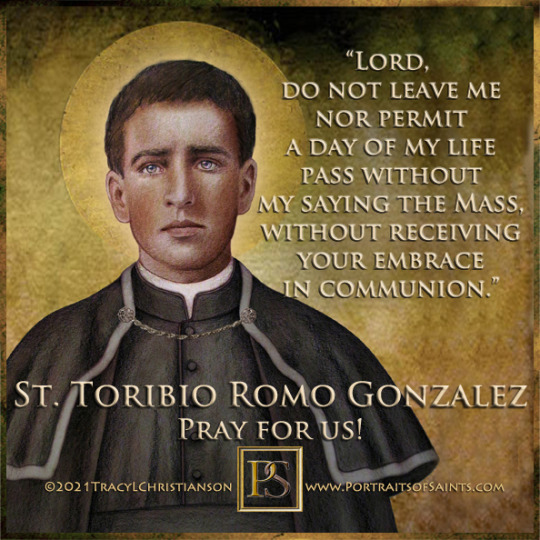
Saint Toribio Romo Gonzalez
1900-1928
Feast Day: May 21
Patronage: Immigrants
Saint Toribio Romo Gonzalez was a young parish priest who died during the Cristero war and was canonized as one of the Martyrs of the Catholic Action Movement in Mexico. He courageously exercised his ministry even when religious persecution intensified and calmly accepted martyrdom, forgiving his persecutors. Today many people have encountered St. Toribio’s miraculous help while migrating on their journey.
Prints, plaques & holy cards available for purchase here: (website)
75 notes
·
View notes
Text



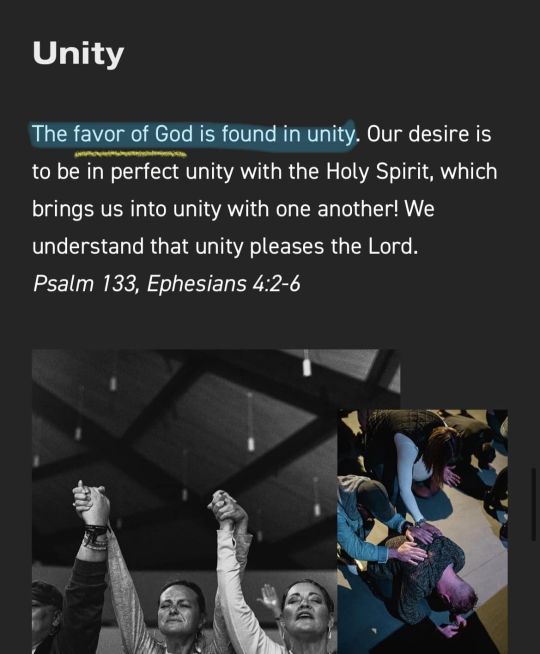
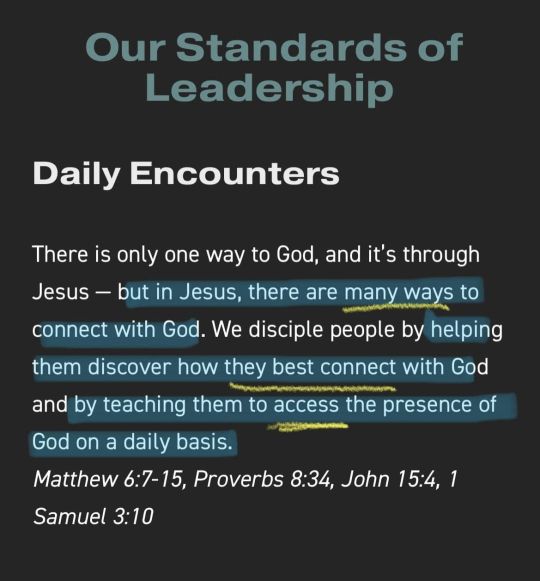

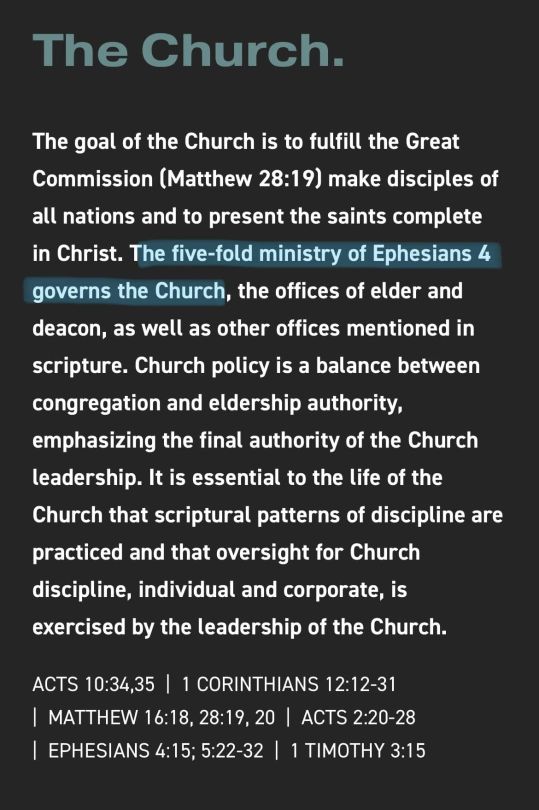

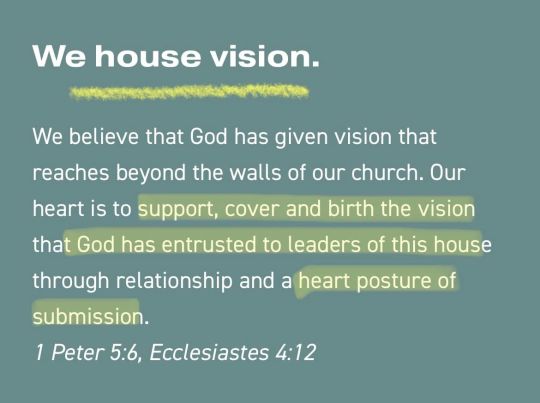
Dr. Michael Brown is held up as an “apostolic elder” of Mercy Culture Church. This means he is at the top of the “five-fold ministry” structure overseeing this congregation. Mercy Culture teaches the Word of Faith doctrine called “Healing in the Atonement”, a harmful lie claiming that Jesus died for you to be free of sickness and disease in this life if only you have enough faith.
They teach that there are “many ways to connect with God” and they help individuals find their own unique way of “accessing His presence”.
They emphasize finding favor with God. Friends, you will only find favor with God through the finished work of Jesus Christ. Your good works will not earn favor because they’ll never be good enough for our Holy Creator. He gives you His favor solely on behalf of Christ and His amazing grace.
You may have heard of the purpose driven church, but have you heard of “presence driven church”? Me neither. Our access to the presence of God is also solely based on the merit of the Son of God. Read the entire book of Hebrews please. No singular congregation has more access to His presence than another. His presence is not something that music and emotion can usher you into. The only way you get to the throne of grace is by faith in the Great High Priest.
I could go on, but take things like this as an exercise in discernment. Run from leaders that claim to have the secret sauce to finding favor with God and accessing His presence. The Gospel is the very public good news of how needy sinners find favor with the thrice holy God.
It’s not a secret and there aren’t many unique ways to connect with God. He’s spelled out exactly how He wants you to approach Him. It’s not something to experiment with. Come to Him on His terms and be at peace through Jesus our Lord.
Amen.
These Aren’t the Apostles You’re Looking For
14 notes
·
View notes
Text
What if, the Ministry summoned a handful of ghouls a long time ago and let them live and naturally breed in the nearby woods, since summoning is really expensive and too dangerous to do often. Sometimes the ghouls come to serve at the ministry, but that’s kind of seen like someone wanting to be a priest or sth.
Point is, what if the ghouls all still had their birth families on the surface. In a little ghoul community. A Ghommunity.
I feel like Swiss would come from a large family, always loving to take care of his little siblings but got taken advantage of by his parents to always watch over the young ones. Think Brock from the Pokémon show.
Dew has one older sister he doesn’t speak to that much, she was cruel to him as kits in the way older sisters are. Parents left off to who knows where when they were reaching maturity and havent seen them since. Dew tends to stay on Abbey grounds.
Aether has one younger brother, like, much younger. Still a kit, only born a few years ago kind of young. Omega is his older cousin, and omega went back to the forest after leaving the band.
Rain is an only child. He was raised by his two moms, (no one knows who his birth parents are. He just kind of showed up one day and they took him in.) They were kind of outcasts as a family, but they were proud of Rain when he left and they love when he visits.
Mountain… Mountain says he has a family, but he sounds sad when he speaks about them. Mountain doesn’t leave the Abbey grounds. No one asks him about it.
Cirrus has twin older siblings. Always trying to one up them, she gained a super competitive streak. Her family and Cumulus’s family grew up as close friends, so when they both Joined the Ghost Project they were inseparable
Cumulus grew up best friends with Cirrus’s older twin siblings. She hung out with Cirrus, but not until later in life right before they joined the band. Her parents were the sweetest ghouls, but would still rip anyone apart who would do their baby harm.
Sunshine is an orphan, mother died in birth and father in a hunting accident. But ghouls on the surface are more tight knit than those in hell. Down below, Sunshine would have been ripped apart. However up here, the ghouls all came together to raise her, and everyone in her village knows her and treats her as family.
#ghost#nameless ghouls#nameless ghoul fanfic#nameless ghoul headcanon#Aether ghoul#Swiss ghoul#mountain ghoul#dewdrop ghoul#rain ghoul#cirrus ghoul#cumulus ghoulette#sunshine ghoul#pyre headcanons#pyre fanfic#fanfic ideas
143 notes
·
View notes
Text
SAINT OF THE DAY (February 26)
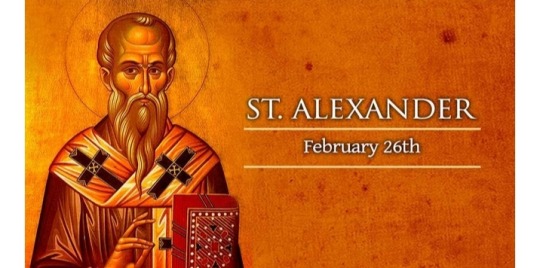
St. Alexander succeeded St. Achillas as bishop of Alexandria in 313.
Alexander was a champion of orthodox Catholic teaching. The majority of his ministry was dedicated to fighting against the Arian heresy.
Arius, a priest of Alexandria, claimed Jesus was not truly God and that there was a time when the Son, the second person of the Trinity, did not exist.
The bishop was gentle with Arius but when Arianism started accumulating a larger following, Alexander finally excommunicated Arius.
The sentence of excommunication was confirmed in the year 320.
Alexander's epistle on the Arian heresy has survived and remains an important part of ecclesiastical literature.
It is assumed that Alexander drew up the acts of the first General Council of Nicaea in 325, where Arianism was formally condemned.
He died in Alexandria two years after his return from the council.
Alexander was also famous for his charity to the poor and his doctrine on life.
6 notes
·
View notes
Text
It is significant that it is not only the negative qualities of a victim that have been projected upon women: the propensity for being temptresses, the evil and matter-bound "nature" of the female, the alleged shallowness of mind, weakness of will, and hyper-emotionality. The qualities that Christianity idealizes, especially for women, are also those of a victim: sacrificial love, passive acceptance of suffering, humility, meekness, etc. Since these are the qualities idealized in Jesus "who died for our sins," his functioning as a model reinforces the scapegoat syndrome for women. Given the victimized situation of the female in sexist society, these "virtues" are hardly the qualities that women should be encouraged to have. Moreover, since women cannot be "good" enough to measure up to this ideal, and since all are by sexual definition alien from the male savior, this is an impossible model. Thus doomed to failure even in emulating the Victim, women are plunged more deeply into victimization.
It is also important to remember that in medieval theology Jesus came to be understood as the priest par excellence, who offered the supreme sacrifice of himself on the cross. The priestly caste in the church then came to be understood as those set apart and enabled in a special way by their ordination to participate in this sacrifice, identifying with Jesus in the act of offering his body and blood in the Mass. Women universally have been excluded from this role on the basis of sex. This imposed incapacity to identify ritually with the supreme scapegoat, in the sense of officially and actively "offering the sacrifice of the Cross" (or in fact participating officially in any ministry in Roman Catholicism) may at first seem inconsistent with women's victimized role within Christianity. However, a closer analysis reveals a basic consistency. As the powerless victims of scapegoat psychology, women are deprived of the "credit" for sacrifice and the dignity of taking an active role. Women are not the “innocent” victims offering the self in immolation for the sins of others, as Christian theology has imagined Jesus. In fact, the blame is never lifted from the female sex. Those in the official priesthood share in the "innocence" and active dignity of the Christ. Women, though encouraged to imitate the sacrificial love of Jesus, and thus willingly accept the victim's role, remain essentially identified with Eve and evil. Salvation comes only through the male.
-Mary Daly, Beyond God the Father: Toward a Philosophy of Women’s Liberation
26 notes
·
View notes
Text
Some part of me must have died the first time you called me (and some part of me came alive)
Day 3 - Sede Vacante
Lord Voldemort spread his long, pale fingers, examining his new body under the moonlight. He was back in his rooms at Malfoy Manor. Everything had been left untouched.
Everything Lucius had hidden for him before the Ministry reached into every corner of this house.
He was back, truly, and he would occupy his rightful place once more.
The priest at the orphanage used to talk about the times when there was no one to sit the throne of the church. Sede Vacante, it was called.
He moved from the rectangle of moonlight drawn on the floor to his armchair by the fireplace. It was a tall thing with a winged back, covered in deep green leather. It had been the sole piece of furniture by the fireplace for many years.
Until she had conjured an armchair for herself. He had dared her, teasing her by always kicking the same cushion her way whenever he meant to sit by the fire.
And his Bella had simply conjured a place for herself. The same way she had carved a place inside him.
Lord Voldemort stared into the empty throne of his paramour.
He would have her back soon enough. In her rightful place. By his side.
Also on AO3
14 notes
·
View notes
Text

“But when Christ appeared as a High Priest of the good things to come [that is, true spiritual worship], He entered through the greater and more perfect tabernacle, not made with hands, that is to say, not a part of this [material] creation. He went once for all into the Holy Place [the Holy of Holies of heaven, into the presence of God], and not through the blood of goats and calves, but through His own blood, having obtained and secured eternal redemption [that is, the salvation of all who personally believe in Him as Savior]. For if the sprinkling of [ceremonially] defiled persons with the blood of goats and bulls and the ashes of a [burnt] heifer is sufficient for the cleansing of the body, how much more will the blood of Christ, who through the eternal [Holy] Spirit willingly offered Himself unblemished [that is, without moral or spiritual imperfection as a sacrifice] to God, cleanse your conscience from dead works and lifeless observances to serve the ever living God?” —Hebrews 9:11-14 (AMP)
“But God demonstrates his own love for us in this: While we were still sinners, Christ died for us.” —Romans 5:8 (NIV)
“Even before he made the world, God loved us and chose us in Christ to be holy and without fault in his eyes.” —Ephesians 1:4 (NLT)
“Personal Holiness” By In Touch Ministries:
“Sometimes comparing ourselves to others leaves us feeling insecure, but other times it stirs up false pride. When we see others being mean, selfish, or lazy, we might think we’re better—and deserving of a place in heaven. In reality, we can always find someone “lesser” to make ourselves feel more holy. But compared to God’s perfect holiness, every person is lacking.
The truth is, whether or not we go to heaven has little to do with us—and everything to do with our heavenly Father. He was the one who made a way for our righteousness, and it wasn’t in response to our behavior. In fact, God decided long before we were born—before we had the chance to do anything good or bad—that He would offer the gift of salvation. Paul wrote to the Ephesians that God “chose us in Him before the foundation of the world, that we would be holy and blameless before Him” (Ephesians 1:4).
If you find yourself trying to compare your holiness to that of others, or trying to prove to God that you’re worthy, remember what Paul wrote to the Romans: “While we were still sinners, Christ died for us” (Romans 5:8). That’s how you know salvation can only be received.”
#hebrews 9:11-14#romans 5:8#ephesians 1:4#bible#christian blog#god#belief in god#faith in god#jesus#belief in jesus#faith in jesus#bible verses#bible truths#bible scriptures#bible quotes#bible study#christian devotionals#daily devotionals#christian life#christian living#christian faith#christian inspiration#christian encouragement#encouragement#christian motivation#christian quotes#holiness#in touch ministries#keep the faith#make him known
29 notes
·
View notes
Text
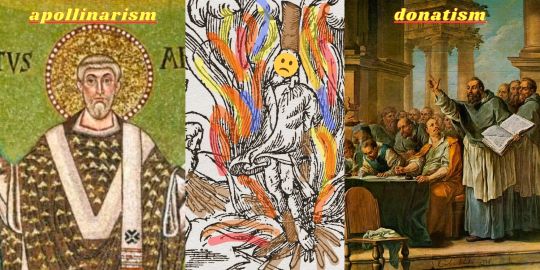
battle 2! descriptions of each below the cut, plus wikipedia links if you would like to read more.
apollinarism: guess what? jesus had a human body, but instead of a human soul, he had the Divine Logos. so he wasn't actually FULLY human, and he had just the one unified nature, instead of the dual nature of being fully god and fully man at the same time.
donatism: for your clergy to provide effective ministry and in order to be able to administer valid sacraments, they have to be completely faultless. your priest recanted under pressure of religious persecution? he can't consecrate the eucharist.
this group arose in the fourth century on carthage. after a period of religious oppression, multiple church officials who had recanted their faith returned to the church. one of those officials consecrated the new bishop of carthage, but the bishop wasn't valid since the guy who consecrated him wasn't valid, and this created a whole chain of formally recognized church authority whose offices were void in the eyes of the donatists--until the sect died out a couple centuries later.
28 notes
·
View notes
Note
Tell me a little about your Clergy headcanons. Like what kind of satanism they practise, the hierarchy, the project itself. Gimme gimme gimme.
I’m SO happy you asked this because I have a super clear image of how I imagine this sort of thing to be at the ministry:
As for the religion itself, theistic satanism ALL THE WAY.
At the ministry, they actually worship Lucifer. It’s not symbolic at all, they actually worship him as their god and do rituals and everything of the sort.
Basically, I always imagine religion at the ministry to be just like Catholicism except instead of praying to God, they’re praying to Satan instead. So all the prayers are reversed, mass is the same except everything is unholy, etc. and ofc Halloween is the most important day of the year lol
Similar to how Catholicism has certain times of year like Lent, I picture the ministry to have things like that too. Certain times for certain rituals, etc. I even picture them having a time of year similar to Lent where church members participate in solemn prayer, hard work, and giving something up to show respect for Satan! (Although it would probably be much shorter than 40 days lol.) Because although sin is encouraged, it’s still a religion, and I always picture that there are still rules. Because that makes it more structured and fun! There are things to do, and for newcomers there are many things to learn.
As for the hierarchy, there’s the papal line and then there’s the clerical line. The papal line obviously consists of the Emeritus bloodline, and then the Clergy consists of dark priests, bishops, cardinals, etc. Obviously this would have included Copia when he was still Cardinal because no one knows he’s Nihil’s son.
The Clergy is second in command to the Papacy. As you can see, once Nihil died and he didn’t have any heirs left, Copia fronted the band because he was next in line, and he had been Nihil’s right hand man. Being a Cardinal, he held the highest rank in the Clergy and he also had the second most employee of the month awards. So his own accolades plus Sister Imperator advocating for him is why he was chosen to front the band and then he eventually became Papa as we all know.
So basically the second-in-command is someone who holds the highest clerical rank (cardinal) but because there isn’t just one cardinal in the Clergy, the best cardinal with the most accolades gets chosen. The best of the best, basically.
As for the Papas, I think they’re raised to be Papas. I know there’s some talk about Cardinal Terzo which I do love!! But idk I kind of picture Primo, Secondo, and Terzo to have been raised for fulfilling the role of Papa.
As for the project itself, it’s pretty clear that Sister Imperator is running the show! She’s definitely making the big decisions and taking care of things in the background! However, if a Papa really wanted to stand up and use his authority to get something done, he could probably do it.
(Now I’m just picturing Terzo demanding that the ministry gets a ball pit and he completely overrides Sister Imperator’s wishes against it 💀)
I hope you enjoyed these headcanons! 🥰🖤
#my headcanons#esmiephan#my lovely ghestie#ask box#ghost bc#the band ghost#ghost band#ministry headcanons#the ministry
47 notes
·
View notes
Photo
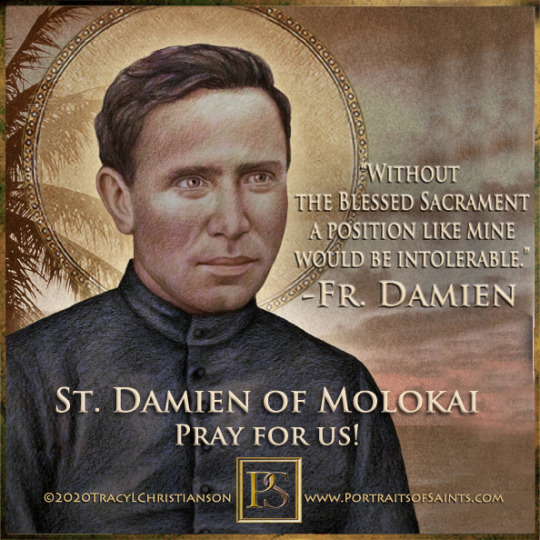
Saint Damien of Molokai
1840 - 1889
Feast day: May 10
Patronage: people with leprosy
Father Damien or St. Damien of Molokai was a priest from Belgium and a member of the Congregation of the Sacred Hearts of Jesus and Mary, a missionary religious institute. He won recognition for his ministry in the Kingdom of Hawaii, to people with leprosy, who had been placed under a government-sanctioned medical quarantine on the island of Molokai. After 16 years caring for the physical, spiritual, and emotional needs of those in the leper colony, he eventually contracted and died of the disease.
Prints, plaques & holy cards available for purchase here: (website)
51 notes
·
View notes
Text
Our priests
(by request, my homily from Sunday)
It’s fun to talk about people. Especially when they’re not around.
Maybe you call it gossiping. Maybe you call it tea. My grandmother called it the local news. Whatever you call it, everybody does it.
One of the most famous moments of talking about people happened when Teddy Roosevelt was President. His daughter, Alice, was well-known for it. For her, the worse the dirt, the better.
So much so, that at Roosevelt’s receptions at the White House. Alice would sit on a couch off to the side, with a pillow on her lap. On which she had embroidered these words, “If you can’t say something nice, come sit next to me.”
If you’ve noticed, there’s someone who isn’t around today. So, let’s talk about him.
If you’ve read Father George’s book, then you know about his backstory. He’s been through some pretty rough things. Including surviving being shot.
But if you think those days are completely behind him, that he’s out of danger here with us? That it’s pretty much smooth sailing for him. With our human shortcomings and our spiritual needs as the worst things he has to deal with?
Well, you and I are part of the problem. But we can’t take all of the credit. Because there are other things that he’s dealing with.
And I don’t just mean the obvious things, like ministries, programs, personnel issues, building maintenance, air conditioning that’s older than all of us, the school and everything that goes along with that. Although that’s certainly part of it as well.
There’s more. There’s not being a local. This is the North End after all.
I mean, I was born at St. John’s. I went to Griffin High School. Except for college, I’ve lived my entire life in this town.
But I live on the other side of town, north of the park. And I didn’t go to our School.
Which means that up here, in the North End? I’m not a local either. Tell me I’m wrong.
You and I can joke about it, but there is some truth to it. Now think about how much harder that is, when you’re not just from a different parish on the wrong side of the tracks, but when you’re 8,800 miles from home. And there’s more.
Father George, Father Saji, and all priests are under constant spiritual attack. Because the Enemy hates priests.
Their ministry of serving us, the people of God? The Enemy absolutely hates it.
Because the Enemy knows that through the life of every priest, the lives of our priests, is the means of making God’s grace and love a living, breathing part of our lives. You and me, the very people Christ died to redeem.
Through our priests’ ministry, through their service, through their care, through their time, through their prayers, and through the Sacraments – most especially Reconciliation and the Eucharist – they are God’s special instruments of grace and forgiveness to a lost and weary world.
And they need our help.
What can you and I do about it? How can we help?
I’m going to make a big ask. I don’t want money. I want us to give something more valuable, the most precious thing that you and I have in this life. The one thing we can never get back – our time.
I want us to use a little bit of the most precious thing that God has given us, to pray for our priests.
Please join me now in praying the prayer of St. Therese of Lisieux, the Little Flower, for our priests and for all priests:
O Jesus, I pray for your faithful and fervent priests;
for your unfaithful and tepid priests;
for your priests laboring at home or abroad in distant mission fields;
for your tempted priests;
for your lonely and desolate priests;
for your young priests;
for your dying priests;
for the souls of your priests in Purgatory.
But above all, I recommend to you the priests dearest to me:
the priest who baptized me;
the priests who’ve absolved me from my sins;
the priests at whose Masses I’ve assisted and who’ve given me Your Body and Blood in Holy Communion;
the priests who’ve taught and instructed me;
all the priests to whom I am indebted in any other way, especially ____
O Jesus, keep them all close to your heart,
and bless them abundantly in time and in eternity. Amen.
But let’s not stop there. I want us to keep praying for our priests. I want each of us to take a week, or two or three, over the next year and remember to pray for our priests in our daily prayers.
It can be something as beautiful as the prayer of St. Therese that we just prayed. It can be a decade of the Rosary. It can be a simple as “Lord, please bless and protect Fr. George and Fr. Saji.” Whatever way you want to do it, it would do so much good – for them and for our parish – if all of us together would lift up our priests in prayer over the next year.
In the narthex, there’s a signup sheet. Please sign up for a week, or two or three, make that commitment to lift up our priests in prayer each day for those weeks.
Help them to be God’s instruments of grace and forgiveness to a lost and weary world.
Help them to be the priests that we need.
By giving the gift that only you can give. By praying for our priests.
Today’s Readings
#Priests#Pray for our priests#God#Jesus#Catholic#Christian#Church#Spiritual Warfare#St. Therese of Lisieux#Prayer#Moments Before Mass
14 notes
·
View notes
Text
If anyone needs to see this, the ancient Greek word latinized as "pais" was just the word for "child". I saw it being misused in a hot take on Tumblr yesterday regarding the centurion story but couldn't find the post this morning. Since Greek is gendered, there is both a male and female declension ending for how it was used in the sentence. It's presence in the centurion story in Matthew 8:6 does not indicate a homosexual relationship. Here is the Liddell-Scott (intermediate or middle version) entry for "pais" on perseus https://www.perseus.tufts.edu/hopper/morph?l=pai%3Ds&la=greek&can=pai%3Ds0&prior=o(&d=Perseus:text:1999.01.0155:book=Matthew:chapter=8:verse=6&i=1#lexicon
http://www.perseus.tufts.edu/hopper/morph?l=pai%3Ds&la=greek&can=pai%3Ds0&prior=o
Liddell-Scott has been the authoritative lexicon for ancient Greek into English for a long time. There is no mention of a gay relationship in this entry of the lexicon. It was also used for one's own children, but it could be used generically for children, or could also be used in some cases for servants and slaves too.
So the child could have been the centurion's own son, which would make the account closer to a similar story in the Gospel of John chapter 4. The words "pais" and "huios" were used interchangeably in the John 4 story so that is clearly referring to the official's son despite the official using "pais" to refer to his own son in John 4:49. Back to the Matthew 8 story, scholars have interpreted "pais" as servant due to the context of the passage, but the word does not clearly define the relationship because like in Matthew 8:8, the phrase "ho pais mou" is literally "my (male) child".
So even though the child could have been a son, it is also possible that the child was a servant, apprentice, or slave being abused by the centurion. The ancient pagan Greeks saw an older male's sexual relationship with a male child as a respected form of mentorship, and the pagan Romans emulated the Greeks. However, even if that was the case then it was not the servant or slave child's fault that he was being abused in a homosexual pedophilic relationship. Jesus could have just commended the Roman centurion's faith and had mercy on the centurion's victim without wanting to piss off the Romans by going against the accepted Greco-Roman norms of slavery, pedophilia, and sexual coercion. This event was early in the ministry of Jesus and not in His time to die yet. He hadn't even gotten all the Disciples yet at this point in time (the calling of the disciple St. Matthew was later in chapter 9.) He probably would have died a lot sooner had He denounced a centurion like that, and there would not have been 12 Apostles. Also, there probably would not have been a Gospel of Matthew written since St Matthew had not been called yet, had Jesus denounced the centurion for pedophilic abuse at that moment.
Whatever the case, the story of the centurion and the child is not approval by Jesus of homosexual pedophilic relationships, especially given the context of the rest of the Bible. A better argument could be made to soften the interpretation of the rhetoric of St Paul against homosexuality by considering the Greco-Roman culture of male homosexual pedophilia and their concept of the penetrator being the dominant one and not really gay, while the penetrated was the servant or submissive one and therefore the actual gay person. That is why pagan Roman officials could penetrate other guys without being judged for being gay. The slaves and foreigners could be penetrated, but not Roman men (especially officials and politicians). It was a system of sexual exploitation, and the early Catholic Church should be given at least some credit for removing acceptance of homosexual pedophilia from mainstream society and instead recognizing pedophilia now as a terrible sin to prosecute (even if deviant priests are guilty of it).
7 notes
·
View notes
Text
Whump Month: Day 2, Collapse
You gotta bear with me on this one, this is stream of consciousness that happened after I dropped one headcanon into a personal server about Copia attending the Papas funerals (inspired by me watching ‘The Haunting of Hill House’ with my friends and getting to the kitten eulogy because anything can be about my hyperfixation if I think hard enough) that spiraled into this. I promise ‘collapse’ comes into play but like...you gotta get there. Also welcome to me introducing you in the worst way to my own personal Ghost lore, more (and happier, I hope) is soon to come about Papa Meno, Beau (belonging to my lovely friend Brian), and Piccolo, but for now this is what you get, sorry not sorry.
Of course once again, this is for the lovely @cirrus-ghoulette‘s Whump Month, and I do hope you enjoy!
Relationship: Copia/Terzo
Summary: Copia and the sudden, unpredictability of death. (Learning to understand funerals from experience.)
Word Count: 2,512
Rating: Gen
Copia was fourteen when Meno was killed, it was the first time he'd witnessed the death of a human, and the very first funeral he ever attended. And it was a very grand funeral at that, being that Papa Meno was well loved amongst the Clergy and by the Ministry staff, and of course by the ghouls. All the stops were pulled out for Meno, he was preserved and displayed in a beautiful, ornamental glass coffin at the very head of the hall of Papas where the funeral was to take place, and the turnout was more than almost any Papa had ever seen in history. The ceremony began with the coffin covered, and everyone would be allowed to see him at the end, but Copia couldn't take his eyes off of the curtain that hung in front of where he knew his father was laid.
Nihil, the then acting Papa didn't want to Witness (in the sense of a priest hosting a funeral) the funeral, so the honour went down the ranks to the then Cardinal Primo. Primo spoke highly of Meno, of his successes, and of his life. How he served the Clergy well, and stayed true to the Path, and how he stayed true to love above all things. He'd invite his brothers to speak, and he'd invite Beau to speak, and he'd invite Copia to speak.
But Copia would have no idea what to say. He'd never really had to think about it, the thought of his father dying. He'd been so lively, and youthful, and kind, the thought had never crossed Copino's mind in his life. And yet when Primo called him to speak, and he stood there in front of all the people that had ever cared about his father, it was the only thing he could think of.
The fact that his father had died. His father, this gleaming example of life and love, was mortal. And if he could die just like that, couldn't anyone?
He looked down at his shoes, and askance to the stone beneath where his father was surely laid, his eyes closed, his makeup viley painted on the once warm, smiling face that would greet him in a morning. And he wrung his hands in the way that had his father taking them both into his own so often with a quiet, "Copino…" that always made his anxieties fade. And when he finally looked up, ready to address the people that were waiting with bated breaths to know what the most beloved and youngest known son of Papa Meno had to say of his father, he caught the eyes of Beau - his mother, his soother - and all she did was nod, and the words poured forth.
"My father- Our Papa, he- he did not...follow the Path. Not as closely as the Cardinal praised him for, or- or at least not in the way I understand the Path. Because what Satan wishes for everyone is the ability to be selfish, or at least- or he wishes that selfishness need not exist. That everyone may do as they please without that negatively impacting another. But my father he- My father was selfless. To his very core, all he did was give. He gave and gave all of the love he had to give, and so he did not follow the Path. Not in the intended way. He was selfish in giving his love away, and leaving none for himself. His selflessness was exactly what made him the greatest Papa. And-" he smiled, looking towards the plinth behind him, "- the greatest father."
The three brothers had given him each their own signifiers of pride, Primo smiling at him as they crossed paths - him taking his seat and Primo taking to the plinth once more - Secondo giving him a nod as he sat beside him, and Terzo leaning forward to catch his attention, giving him a very certain thumbs up. And when the curtain dropped, and everyone rose to give their own words and to pay their own respects, Copia had very few words left to offer his father other than a quiet, “Thank you,” with a bow of his head.
The words hadn’t felt right at the time, and they continued to feel strange in his chest each and every time he caught a glimpse of the man in the hall of Papas. But each brother that followed after him to see him laid in his coffin spoke the same two words, so he supposed that they had been fine words to give. The funeral left him feeling closer to the brothers than ever before, and even so further away. A defence mechanism, he reasoned with himself, in case the same jarring fate befell any of them.
It seemed he was right to be cautious.
Copia was forty-one when he attended his next funeral. And it was just as unexpected as the last. But in the time since his last, he had had time to think, to ponder over what life had meant to him, what his father's life had meant and what everyone's lives around him meant. The nature of mortality - at least in the closest sense one could get to mortality within the Ministry's walls - and the possibility of losing those around him. So when he walked into the hall of Papas (his own father mounted at the head of the hall in his glass tomb, crucified inversely beneath the great stained glass window that shone down into the hall, painting the dull marble vibrantly. The stained glass had been his father's own installation, his contribution to the hall of Papas - aside from his own body, in the end - and it was just about the only thing Copia could bear to focus on), his hands folded neatly against his chest as he followed along behind Beau, and his brother Piccolo behind him, he had his words prepared.
He'd had them prepared for years, only altering them after certain core moments spent with each of them, each of his predecessors as they'd come to be. He'd never imagined becoming a Papa, his father had told him it would be an honour that passed to him as the succession allowed, but only if it was something he'd wanted. And really, it never had been something he'd wanted, he was more than happy in his role as Cardinal, and fitting into the position that he'd known his father held for most of his life never seemed possible for him. His father had grace, and poise, and command of a room that Copia had never inherited, but with time spent, and lessons learned, taking mental notes upon mental notes from each Primo, Secondo, and Terzo, he believed that maybe now he'd have the chance. That maybe he had thieved enough of each of them, and what made them alone wonderful Papas, that he too could make it into this hall someday.
Though he hoped, not in this way. In the way of a glass box, wheeled through by nameless ghouls that didn't give him a second look as he took his seat. One of many seats, though unlike his father's funeral most of them laid empty. The Papas were so loved, weren't they? He recalled their lives in a flash, how they had given so much, had been supported in each and every endeavour, and yet; the hall was silent. Not even half filled with masked ghouls, Siblings of Sin, a few Clergy members. How could their outreach have touched so few? Copia's heart clenched at the wonder, his eyes darting to where he assumed Terzo would be roiling in his little glass prison. How dare so few people come to mourn him, and to celebrate him. Copia's words about Terzo shifted in his mind, he'd address that, certainly.
And he prepared himself to speak as Papa Nihil stood to the plinth, though he couldn't help to keep glancing from the prismatic colours of the window, the sharp edges of his father's visage high on the wall, to where Nihil stood droning mindlessly about the relatives that lay adorned and cold. Copia's mind mixed memory with reality in each flick of his gaze, Nihil's colourless speech being replaced by the vivid one that was given by his son, Primo, all those years ago. Primo had Witnessed the last funeral that Copia had attended, and he had found himself moved, and focused - pin-point attention on the Cardinal - when Primo spoke, but Nihil's voice faded out almost the moment he began. There was nothing behind his words, Copia could tell, and even still he spoke? He decided to Witness this ceremony, despite his detachment? Was it not the same as one previous? Copia was half a mind to scoff, of course the dickhead would Witness his own sons' funerals, but not his father's. Pathetic.
But he kept his opinions to himself, and shuffled the mental flashcards that held his speech ready to be called to speak for the three men that had played such a large part in his upbringing. With each and every line that he recited to himself, speaking the words silently - his lips moving imperceptibly, and yet with more animation that Nihil was giving with his entire body - the corresponding moment that had prompted them flashed before Copia's mind, looping their best and worst times with him over and over until Copia was sure he would be able to give a play-by-play of his life alongside them when he was finally called up to give his two cents.
But he wasn't.
Nihil spoke and spoke, his hands moving but his words stone-still, and then he was done, and the curtain fell, revealing the Papas to the hall, and people rose from their seats to pay their respects. And Copia couldn't move.
Where was his turn? Primo had let him speak- would've let him speak. They all would've let him speak, they all would've wanted him to speak. That was what this was about, wasn't it? What they would've wanted? That was what Primo had said, what Secondo and Terzo had both said as they stood in front of the hall, recalling memories of his father and everything he had done with and for them. 'It was what he would've wanted,' all of their voices reminded him. That was why Primo had called him to speak, that was why Nihil should've called him to speak. Copia meant a hell of a lot more to the three of them than Nihil ever did, so why?
His mother's hands took his own in hers, gentle and soft, and familiar. The way his father used to. And she drew him to stand even though his entire nervous system felt frozen, like his mind was shutting down because, was this what they really wanted? Had it been something they discussed? His father had wanted him there, to speak when he was gone, so had the three of them agreed they didn't want him to speak for them? Was that why he had been snubbed of his chance to say his final piece? Did he really mean so little to them?
His mother and his brother led him up to each of them in turn. To Primo, who looked peaceful in a way that Copia hadn't seen in a very long time, even with his makeup painted in its ever disgruntled expression, who he couldn't open his mouth to say goodbye to. To tell him all of those memories he held dear, of how he looked up to him moreso than he ever did the others. How he strived to be patient like him, to listen like he did, to pay attention to the little things like he did. Not a word left his lips that began to tremble, and he was guided on to Secondo.
To Secondo who he hadn't seen painted in years, who was painted then and Copia could only think how much he wanted to wipe it away, that it would hurt him even in death. His hands trembled, walking up to Secondo, and he wanted to reach out, to gently wash away the paint that the man had come to hate, but they wouldn't obey him, just as his voice refused to speak the words he'd never said aloud. Because Secondo wasn't a sentimental man, he didn't want to hear the 'I love you's and the 'I appreciate you's, actions meant more to him, but even still Copia couldn't bring himself to commit to just one more loving gesture for him. So he was moved on.
Onto Terzo. Whose presence in that box, arms pressed tight to his torso in a way that made him seem so much smaller, so much more uncomfortable, made Copia's heart scream. And he moved without willing himself to, breaking away from the hands of his mother and brother that held him, prising at the edges of the box futily with his gloved fingers. He wanted nothing more than to let him out, than to give him space, room to breathe and to stretch because Terzo hated being anywhere too small, and too tight. He'd always hated it, hated being crowded and closed in, hated feeling small. And they'd only gone and made him look so, so small. Copia couldn't bear it, he prised and gripped and thrashed at the boxes edge silently, tears falling from his face and onto the glass as his family tried to pull him away, but in the moment he couldn't hear them, all that his ears picked up on were the panicked, shuddering breaths of Terzo - his Terzo - when Copia had found him locked away in a cupboard, screaming and crying for someone, anyone to just let him out. Copia had been the one to let him out then, and he wasn't going to let him down now, he had to let him out-
When the lid clattered open, shattering against the marble floor, Copia slid down, a slow collapse to his knees uncaring of the shards that crunched beneath them that sliced open his trousers and his skin alike. He'd done it, and his shoulders sagged as he let out a breath that sounded far away from his ears, his mind implying that Terzo could finally breathe. He looked up, to make sure he'd done the job right, and something about Terzo's face seemed to have smoothed out, his shoulders didn't seem to be hunched by his ears, and he looked so much more like himself. Enough like himself that Copia managed to smile. And his now bloodied hand reached over the coffin's edge, his knuckle grazing Terzo's cheek lovingly.
"You can rest now," He spoke. And none of those words were apart of the monologue he'd prepared, but if there was one thing Terzo had imparted upon him in life, it was that you just make do with what you have, and if all the words you can muster are those, then that will do just fine.
He would do just fine.
#ghost the band#ghost bc#ghost fanfiction#whump month#papa emeritus iv#papa copia#papa emeritus iii#papa terzo#papa emeritus ii#papa secondo#papa emeritus i#papa primo#copia#terzo#secondo#primo#ghost oc#copia/terzo#claustrophobic terzo#autistic copia
14 notes
·
View notes
Text
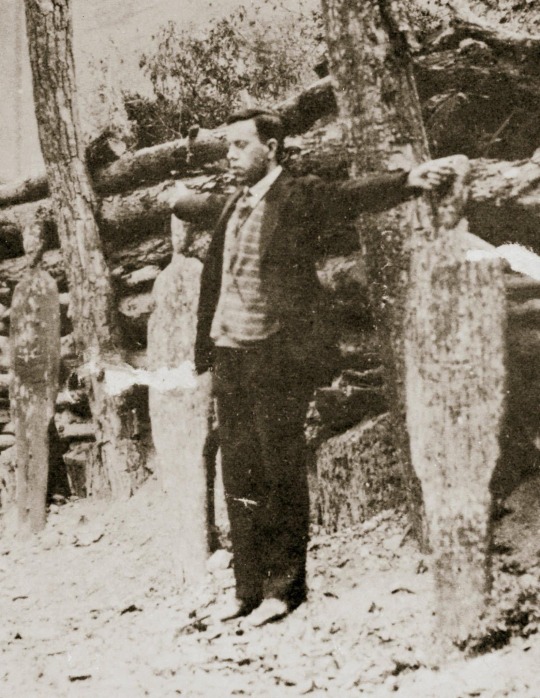
Blessed Miguel Agustín Pro
Son of a mining engineer. From childhood he was known for high spirits and cheerfulness, and he grew up in a pious home. Born to privilege, he had great affinity for the poor and working classes. Victim of recurring stomach disorder. Jesuit novice at 20. Exiled during the Mexican Revolution, he continued his studies abroad.
Ordained in Belgium in 1925 at age 36, he returned to Mexico in 1926, a time when churches were closed, priests were in hiding, and persecution of the Church was government policy. Father Miguel used disguises to conduct an underground ministry, bringing the comfort of charity and the sacraments to the covert faithful.
Falsely accused in 1927 of a bombing attempt, Pro became a wanted man, was betrayed to the police, and without trial, he was sentenced to death. The photograph on this page was taken the day of his martyrdom. As he was about to be shot, he forgave his executioners, refused a blindfold, and died shouting "Long live Christ the King!" The government prohibited a public funeral, but the faithful lined the streets when his body passed.
43 notes
·
View notes